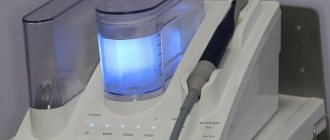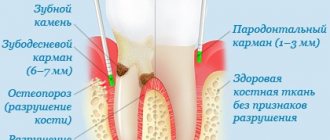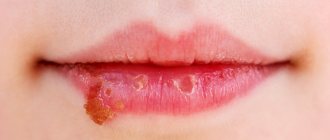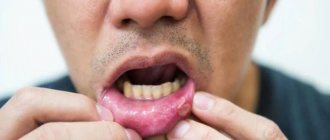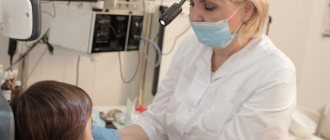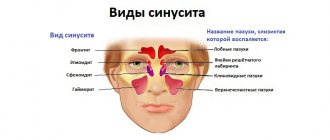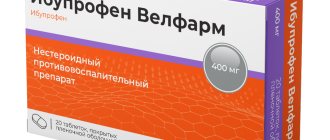With a sore throat, a person complains of soreness, scratching, irritation, discomfort, and a burning sensation in the throat. The throat is sore, it is difficult to swallow food, drink, these sensations intensify when swallowing or talking.
Sore throat may be accompanied by swelling of the throat mucosa, difficulty swallowing, soreness and enlargement of the cervical lymph nodes, the appearance of white or yellowish spots on the tonsils, coughing, sneezing, nasal congestion, runny nose, fever, chills, excessive salivation, muscle and joint pain, headache, nausea and vomiting, skin rash, loss of appetite, feeling of a lump in the throat, heartburn, hoarseness.
Causes of sore throat
Most often, a sore throat is associated with a viral infection (ARVI, influenza, Coxsackie virus, new coronavirus infection, chickenpox, measles). A sore throat caused by a bacterial infection (such as streptococcal infection) is less common. Other causes of sore throat include:
- tonsillitis (tonsillitis);
- epiglottitis;
- mononucleosis;
- paratonsillar, parapharyngeal, retropharyngeal abscesses;
- allergies (to pollen, mold, dust, animal hair and epidermis);
- dry air, air pollution (tobacco smoke, chemicals);
- breathing through the mouth with nasal congestion;
- spicy food, alcohol;
- overstrain of the muscles of the larynx and pharynx (during shouting, the habit of speaking loudly, lecturing);
- gastroesophageal reflux disease (GERD);
- malignant tumors of the tongue, throat, larynx;
- HIV infection.
Risk factors for a sore throat include: childhood and adolescence (usually bacterial infections), smoking (including second-hand smoke), frequent or chronic sinus infections (sinusitis), seasonal allergies or prolonged exposure to allergens such as mold, dust, pet hair, exposure to chemicals, weakened immunity (due to illness or treatment, for example, chemotherapy drugs).
Contraindications to the use of sprays
In some cases, throat sprays for children have contraindications.
Obstructive processes in the bronchi. These conditions are characterized by bronchospasms (strong and sharp narrowing of the lumen of the bronchi) and respiratory dysfunction. Any irritation of the mucous membrane of the throat, including contact with medicinal substances, can provoke bronchospasm.
Allergy to at least one component of the drug. Medicines include one or more active ingredients and auxiliary components. Before using any throat spray for children, you should carefully study the instructions and composition. If the list of substances contains even one component to which the child’s immune system is hypersensitive, then the spray should not be used.
Atrophic pharyngitis. With this disease, the mucous membrane of the pharynx becomes thinner and loses its ability to perform its functions. Accordingly, the mechanisms of action of sprays for children against sore throat are disrupted when they come into contact with atrophied mucous membranes, as a result they can cause undesirable changes in it.
When should you see a doctor if you have a sore throat?
You should consult a doctor if the sore throat is severe and lasts more than 4-5 days, there is difficulty swallowing (breathing), difficulty opening your mouth, a rash on the skin, blood in saliva or sputum, temperature exceeds 38.3˚C, swelling is observed tongue or neck, pain in muscles and joints. A child needs to consult a pediatrician if his sore throat is accompanied by difficulty breathing or swallowing, stridor (noisy wheezing), or excessive salivation.
Diagnosis of a sore throat includes anamnesis, physical examination, if necessary, the doctor takes a culture from the throat (bacteriological examination), and conducts a universal rapid test for the presence of group A beta-hemolytic streptococcus in the throat.
A viral sore throat does not require treatment. To relieve associated symptoms, you can take ibuprofen or paracetamol (caution, do not give aspirin to children!), use anesthetic sprays or lozenges, gargle with warm salt water, drink plenty of fluids, and get plenty of rest. If a sore throat is caused by a bacterial infection, antibacterial drugs are prescribed, it is important to follow the doctor's recommendations regarding the duration of their use and dosage. For sore throat associated with allergies, GERD and other diseases, appropriate drug therapy is prescribed (antihistamines, antacids, proton pump inhibitors).
What is more effective: sprays, tablets or lozenges?
The choice of dosage form directly depends on the cause of the disease and the nature of the pain. In particular, if the sore throat is caused by bacteria, then the best choice is a spray with a pronounced antiseptic effect. It is important to consider that with prolonged use, infectious agents develop resistance to the drug, so if after 2-3 days you do not feel relief, the medicine needs to be changed. So, how to treat a throat?
For a disease of viral origin, it is best to choose a throat spray that relieves pain and fights inflammation. In the case of chronic pain, it is necessary to regularly irrigate the throat with a spray with a moisturizing effect that does not contain aggressive substances and carefully relieves unpleasant symptoms.
Many drugs reduce symptoms due to the local anesthetics they contain - phenol, benzocaine or dyclonine. Under their influence, the mucous membrane becomes numb, and the pain noticeably weakens.
Throat tablets can be divided into several groups. For example,
- with enzymes that eliminate viruses and bacteria;
- NSAIDs that relieve inflammation;
- with fragments of bacteria and viruses that enhance local immunity;
- with extracts of medicinal plants that reduce pain.
Throat lozenges are effective only in the initial stages of the disease. They usually contain menthol, which has a distracting effect rather than a therapeutic one. Therefore, you should not get carried away with candies.
TOP 5 sprays against sore throat
- Miramistin is a broad-spectrum antiseptic spray to combat bacterial and fungal infections. Quickly reduces pain. It is odorless and tasteless. Suitable for adults and children from three years of age, as well as for pregnant women. Disadvantage: relatively high price, analgesic effect lasts several hours.
- Hexoral destroys infections of bacterial and fungal origin. It has an analgesic, disinfecting, deodorizing and enveloping effect. The therapeutic effect occurs within 1-2 minutes after treatment and lasts 10-12 hours. Application: twice a day after meals. Cons: components of the drug can cause allergies, read the instructions carefully.
- Yox can be called an analogue of the legendary Lugol's drug. It has a powerful antiseptic, antiviral, antifungal effect. Reduces pain well. Processing Disadvantages: cannot be used for a long time, contraindicated for people with iodine intolerance.
- Proposol contains propolis extract and a large amount of vitamins. Complete disappearance of pain occurs within 5-7 days. It works well as part of a complex treatment of inflammation. Cons: not suitable for people allergic to bee products.
TOP 5 tablets for sore throat
- Faringosept copes well with pain and fights inflammation in the oral cavity. Has a pleasant sweet taste. Recommended course is 3-4 days. Quickly relieves pain and restores voice. The packaging is enough for a full course. There are few contraindications. Disadvantage: effective at the initial signs of the disease.
- Hexoraltabs contain a local anesthetic, peppermint oil and menthol. They have an antiseptic effect. A decrease in pain is observed during the first minute of resorption. Available in different flavors. Cons: the drug only helps with the initial signs of the disease.
- Neo-Angin has a pronounced disinfectant and anti-inflammatory effect, relieves pain well, quickly restores the voice, and relieves coughing attacks. Large packaging. Dosage: one tablet every 2-3 hours. The permissible number of tablets per day is six. Cons: irritates the gastric mucosa.
- Grammidin contains the antibiotic gramicidin C; tablets with lidocaine are also available, which not only destroy pathogens and cleanse the mucous membrane, but also immediately relieve pain. The anesthetic effect lasts about 40 minutes. Enhance the effectiveness of medicinal rinses. Disadvantage: cannot be taken during pregnancy and lactation.
- Lizobakt has a powerful antiseptic effect. The drug contains vitamin B6, which increases local immunity, and the protein enzyme lysozyme, which breaks down bacteria, fungi and viruses. Suitable for pregnant and lactating women. It is used for all infectious lesions of the oral cavity.
TOP 5 lozenges for sore throat
- Strepsils plus. The active ingredients fight bacteria, lidocaine reduces pain, anise and peppermint oils have a distracting and enveloping effect. Dosage: no more than 1 lozenge within 2 hours. Disadvantage: short period of action, effective at the initial signs of the disease.
- Halls. Due to eucalyptus oil and menthol, it temporarily relieves pain, cools a sore throat, and relieves hoarseness. Minus: it is not a medicine.
- Carmolis contains extracts of medicinal herbs, honey, and vitamin C. The drug quickly reduces pain, refreshes the oral cavity, has a pleasant taste, but does not last long.
- Gorpils quickly relieves pain and has a pronounced antiseptic effect. Helps with initial and acute forms of the disease. Available in different flavors. Disadvantage: short period of action.
- Agisept relieves pain, has a pronounced antimicrobial effect, and significantly reduces unpleasant symptoms at the onset of the disease. Disadvantage: not suitable for people with allergies to medicinal herbs.
These recommendations do not replace visiting a doctor. There are contraindications. Before purchasing the drug, be sure to consult with your physician.
Back to articles
Symptoms of ARVI in children
The child or the child’s parents may notice signs such as:
- Acute onset of the disease, accompanied by a rise in body temperature. Typically, body temperature fluctuates between 37.5-38.0 degrees. Usually the temperature reaction disappears after 2-3 days. A prolonged increase in temperature may indicate influenza or an adenovirus infection. Parents should remember that an increase in temperature over time and increased intoxication in the baby (weakness, lethargy, malaise) may indicate the addition of a bacterial infection. A repeated increase in the baby’s temperature after it has stopped may indicate the development of acute otitis media against the background of a prolonged runny nose.
- Nasal congestion, nasal discharge.
- Burning, pain, tingling, dry throat. Often, an accumulation of mucus, flowing down the back of the throat, can lead to a cough.
- Noise and pain in the ears, hearing loss, clicking. These symptoms develop when inflammation spreads to the auditory tubes.
- Infants become restless and have difficulty feeding and falling asleep.
- Hoarseness may occur.
- Redness of the eyes.
Signs of ARVI persist for 5-7 days, in some cases reaching 10-14 days.
Diagnostics
Diagnostic measures are carried out by an otolaryngologist. If appropriate indications are identified, the patient is referred for consultation to an allergist, oncologist, or gastroenterologist. The diagnostic plan includes the following activities:
- Questioning, general examination
. The doctor clarifies the time and circumstances of the onset of the symptom, finds out other complaints, and establishes the dynamics of the disease. During the physical examination, the specialist examines the throat, paying attention to specific signs: fever, rash, enlarged lymph nodes, swelling of other areas of the body. - Express diagnostics
. Performed during a consultation, it allows you to reduce the time for laboratory diagnostics and identify common infections. A streptate test and a flu test can be performed. For allergies, allergy tests are performed. - Endoscopic studies
. Depending on the existing symptoms, the otolaryngologist performs pharyngoscopy, direct or indirect laryngoscopy, and endoscopy of the larynx. In case of infectious pathologies and neoplasms, material is collected for subsequent laboratory tests. - Lab tests
. Along with a general blood test, which confirms the presence of an inflammatory process in the body, most often in case of swelling of the throat mucosa, a microbiological examination of a smear is performed to determine the microflora and its sensitivity to antibiotics. If tumor processes are suspected, biopsies are studied during histological or cytological examination.
In some cases, radiography of the nasopharynx, larynx or trachea, and X-ray examination of the lungs are indicated. For GERD, esophagoscopy and gastroscopy are performed. Appropriate tests are performed to identify specific infections.
Taking a swab from the throat mucosa
Aqua Maris Strong
Aqua Maris Strong throat spray is a sterile hypertonic solution of sea water. This spray is used for hygienic, therapeutic or preventive purposes. "Aqua Maris Strong" cleanses the throat mucosa, soothes irritation, and protects it from negative factors. "Aqua Maris Strong" helps to increase local immunity of the throat mucosa. The throat treatment spray is presented in 30 ml opaque glass bottles and has a special convenient swivel spout for spraying. “Aqua Maris” for the throat is a clear solution with a subtle smell of sea water. “Aqua Maris Strong throat spray is suitable for treating adults and children from one year of age. But you should be careful when using the spray in very young children, so as not to provoke laryngospasm. “Aqua Maris Strong” copes well with throat diseases in the early stages or as part of complex therapy for pathology of the ENT organs.
Aqua Maris Strong
Jadran-Galenski Laboratories, Croatia
To eliminate swelling of the nasal mucosa, especially for persons with hypersensitivity to chemical drugs, incl.
during pregnancy and lactation. Treatment of acute and chronic inflammatory diseases of the nasal cavity, paranasal sinuses and nasopharynx: - acute and chronic rhinitis; — acute and chronic sinusitis (including acute and chronic sinusitis); - nasopharyngitis from 19
5.0 1 review
506
- Like
- Write a review
Treatment
Help before diagnosis
If swelling occurs, you should ensure a sufficient supply of fresh air, comfortable humidity and temperature in the room, and avoid taking food and drinks that are too cold, too hot, or irritating the mucous membrane of the throat. For swelling of infectious and inflammatory origin, you can gargle with herbal decoctions and use local remedies. In case of allergic reactions, it is necessary to use antiallergic drugs.
An increase in body temperature and signs of intoxication are reasons to contact a therapist or otolaryngologist. Self-administration of antibiotic therapy is prohibited due to the ineffectiveness of this type of treatment without taking into account the characteristics of the pathology, the possible development of side effects and adverse consequences.
Conservative therapy
The treatment regimen may include drug and non-drug methods. For diseases with swelling of the throat, the following are used:
- Local preparations
. Sprays, lozenges, lozenges, and other local dosage forms with analgesic and anti-inflammatory effects are effective symptomatic remedies for viral and bacterial infections and help reduce swelling and discomfort in the throat. - Antiallergic medications
. To quickly eliminate throat swelling and other allergy symptoms, antihistamines and mast cell membrane stabilizers are used. - Antibiotics
. Antibiotic therapy is indicated only for bacterial diseases and is ineffective for viral infections. First, broad-spectrum agents are prescribed, then the treatment regimen is adjusted taking into account the antibiotic sensitivity of the pathogens, as determined by the results of smear culture. - Physiotherapy
. For throat diseases, inhalations, ultraviolet irradiation, UHF, laser therapy, ultraphonophoresis, medicinal electrophoresis, and other methods are prescribed. - Intubation.
Necessary for the development of severe swelling of the throat, the threat of asphyxia.
ARVI and immunity
According to the World Health Organization, ARVI ranks first in the structure of morbidity among young children. There are a large number of viruses that cause ARVI. These include: influenza viruses, parainfluenza, respiratory syncytial viruses, adenovirus, ECHO viruses, Coxsackie viruses, rhinoviruses, reoviruses, coronaviruses. The high incidence of ARVI is associated with unstable immunity in children after previous ARVI, as well as the high prevalence of these viruses. In unfavorable environmental conditions, acute respiratory viral infections predetermine even greater changes in immunity, especially in young children. This can lead to significant changes in the formation of the baby’s immunity, as well as contribute to the development of chronic diseases of various systems of the child’s body at an older age. Considering the high prevalence of ARVI, the issue of treating children with this pathology remains relevant. We will approach the treatment of colds from the point of view of modern protocols for the treatment of ARVI in children, which were developed by the Russian Union of Pediatricians. Before moving on to considering children's medications for colds and flu, it is necessary to understand the main manifestations of ARVI in children.
It is important to monitor the child’s condition and contact a pediatrician at the first symptoms of a cold.

